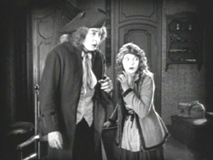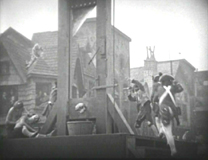|
Newest Reviews:
New Movies -
The Tunnel
V/H/S
The Tall Man
Mama Africa
Detention
Brake
Ted
Tomboy
Brownian Movement
Last Ride
[Rec]³: Genesis
Hara-Kiri: Death of a Samurai
Indie Game: The Movie
Abraham Lincoln: Vampire Hunter
Old Movies -
Touki Bouki: The Journey of the Hyena
Drums Along the Mohawk
The Chase
The Heiress
Show
People
The Strange Affair of Uncle Harry
Pitfall
Driftwood
Miracle Mile
The Great Flamarion
Dark Habits
Archives -
Recap: 2000,
2001, 2002,
2003, 2004
, 2005, 2006,
2007 , 2008
, 2009 ,
2010 , 2011 ,
2012
All reviews alphabetically
All reviews by star rating
All reviews by release year
Masterpieces
Screening Log
Links
FAQ
E-mail me
HOME
| |
Orphans of the Storm (D. W. Griffith, 1921)
 D.W. Griffith’s wonderfully oversized French Revolution
epic Orphans of the Storm audaciously
tackles its mammoth subject by setting real-life figures next to shameless
caricatures and melding a melodramatic plot with a spectacular recreation of the
uprising. During the first reel, a French ambassador admirably tells the
visiting Thomas Jefferson of the United States’ legal system, "That's the
kind of government we want here." France's search for a "REAL
DEMOCRACY”, as Griffith puts it, is the legitimizing subject of this
embellished piece of pumped up historical fiction. With his gung-ho camerawork,
exaggerated emotion and insistent editing, Griffith dictates what we should feel
and refuses the audience an opportunity to judge history for themselves.
Instead, he harnesses the skills that made him one of the cinema’s premiere
storytellers to compose an intense fugue of heightened emotion and suspect
politics.
D.W. Griffith’s wonderfully oversized French Revolution
epic Orphans of the Storm audaciously
tackles its mammoth subject by setting real-life figures next to shameless
caricatures and melding a melodramatic plot with a spectacular recreation of the
uprising. During the first reel, a French ambassador admirably tells the
visiting Thomas Jefferson of the United States’ legal system, "That's the
kind of government we want here." France's search for a "REAL
DEMOCRACY”, as Griffith puts it, is the legitimizing subject of this
embellished piece of pumped up historical fiction. With his gung-ho camerawork,
exaggerated emotion and insistent editing, Griffith dictates what we should feel
and refuses the audience an opportunity to judge history for themselves.
Instead, he harnesses the skills that made him one of the cinema’s premiere
storytellers to compose an intense fugue of heightened emotion and suspect
politics.
 Orphans certainly
has a somewhat bloated sense of self-importance and its moral grounding is
somewhat dubious. Everything is
boiled down to choosing Mercy over Tyranny and Love over Hate - a stance none
would disagree with, but one which grossly oversimplifies the situation.
Griffith shows the aristocrats bathing in a fountain of wine at their orgies
while the poor beg for bread outside, but when the Revolution goes bad and mob
violence ensues, the director shows that he disdains the poor equally. Such
techniques tell the viewer more about the filmmaker than the events that he’s
portraying, but by downplaying one’s reliance on the film’s message, one can
find superb entertainment in Orphans,
even if Griffith’s politics seem faulty. With guillotines, dastardly villains,
blind orphans, a women's prison and epic battle scenes throughout, the film
can’t be fairly called boring. As was the style of the time, the intertitles
have an annoying tendency to explicitly telegraph future plot events, but the
satisfaction in this sort of full-bodied melodrama lies in the execution and not
in the surprising twists of the plot. Griffith’s Dickensian scope and tendency
toward caricature results in a series of undeniably amusing surface pleasures.
Clichéd as they might be, Griffith possess an uncanny ability to make the
dilemmas exciting and almost harrowing. As usual, his work with is cast is
solid, with the most inspired moment coming when he temporarily turns his muse
Lillian Gish into a Joan of Arc figure. In studying his camerawork here, it
becomes apparent that there are fewer sequences that boldly demonstrate
Griffith’s revolutionary technique than in his early epics and only a few
scenes that cross-cut between events, but that’s because the pacing and style
of the film is more akin to modern films. Griffith’s assimilation of the
techniques he helped popularize into his filmic grammar marks a progression for
him. Though there are certainly things about Orphans of the Storm that are problematic (if nothing is nearly as
problematic as something like Birth of the
Nation), the sheer amount of realized ambition on display in it makes it a
sight to behold.
Orphans certainly
has a somewhat bloated sense of self-importance and its moral grounding is
somewhat dubious. Everything is
boiled down to choosing Mercy over Tyranny and Love over Hate - a stance none
would disagree with, but one which grossly oversimplifies the situation.
Griffith shows the aristocrats bathing in a fountain of wine at their orgies
while the poor beg for bread outside, but when the Revolution goes bad and mob
violence ensues, the director shows that he disdains the poor equally. Such
techniques tell the viewer more about the filmmaker than the events that he’s
portraying, but by downplaying one’s reliance on the film’s message, one can
find superb entertainment in Orphans,
even if Griffith’s politics seem faulty. With guillotines, dastardly villains,
blind orphans, a women's prison and epic battle scenes throughout, the film
can’t be fairly called boring. As was the style of the time, the intertitles
have an annoying tendency to explicitly telegraph future plot events, but the
satisfaction in this sort of full-bodied melodrama lies in the execution and not
in the surprising twists of the plot. Griffith’s Dickensian scope and tendency
toward caricature results in a series of undeniably amusing surface pleasures.
Clichéd as they might be, Griffith possess an uncanny ability to make the
dilemmas exciting and almost harrowing. As usual, his work with is cast is
solid, with the most inspired moment coming when he temporarily turns his muse
Lillian Gish into a Joan of Arc figure. In studying his camerawork here, it
becomes apparent that there are fewer sequences that boldly demonstrate
Griffith’s revolutionary technique than in his early epics and only a few
scenes that cross-cut between events, but that’s because the pacing and style
of the film is more akin to modern films. Griffith’s assimilation of the
techniques he helped popularize into his filmic grammar marks a progression for
him. Though there are certainly things about Orphans of the Storm that are problematic (if nothing is nearly as
problematic as something like Birth of the
Nation), the sheer amount of realized ambition on display in it makes it a
sight to behold.
70
08-04-03
Jeremy Heilman
|